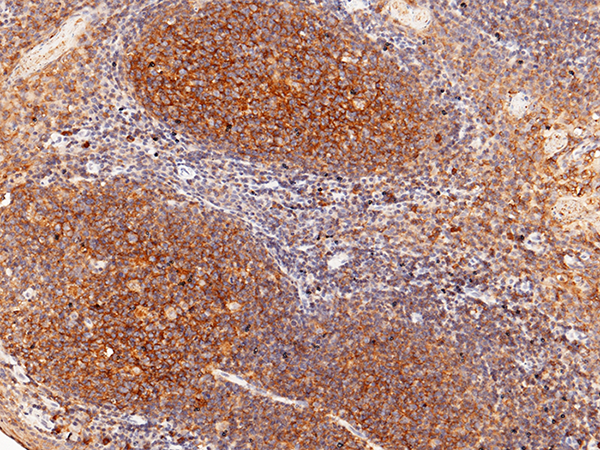-
Product Name
Anti-CD82/KAI-1 antibody
- Documents
-
Description
Mouse monoclonal to CD82/KAI-1
-
Tested applications
IHC-P
-
Species reactivity
Human CD82 / KAI-1
-
Alternative names
R2 antibody; 4F9 antibody; C33 antibody; IA4 antibody; ST6 antibody; GR15 antibody; KAI1 antibody; SAR2 antibody; TSPAN27 antibody; C33 antibody; IA4 antibody; Kai1 antibody; Tspan27 antibody; AA682076 antibody; AL023070 antibody; 4F9 antibody; AA682076 antibody; AL023070 antibody; C33 antibody; C33 antibody; CD82 antibody; Cd82 antibody; GR15 antibody; IA4 antibody; KAI1 antibody; Kai1 antibody; KAI-1 antibody; KAI-1 antibody; R2 antibody; RP23-70K10.2 antibody; SAR2 antibody; ST6 antibody; Tspan27 antibody; TSPAN27 antibody
- Immunogen
-
Isotype
Mouse IgG1
-
Preparation
This antibody was produced from a hybridoma resulting from the fusion of a mouse myeloma with B cells obtained from a mouse immunized with purified, recombinant Human CD82 / KAI-1 (rh CD82 / KAI-1; P27701-1; Gly111-Leu228). The IgG fraction of the cell culture supernatant was purified by Protein A affinity chromatography.
-
Clonality
Monoclonal
-
Formulation
0.2 μm filtered solution in PBS with 5% trehalose
-
Storage instructions
This antibody can be stored at 2℃-8℃ for one month without detectable loss of activity. Antibody products are stable for twelve months from date of receipt when stored at -20℃ to -80℃. Preservative-Free.
Sodium azide is recommended to avoid contamination (final concentration 0.05%-0.1%). It is toxic to cells and should be disposed of properly. Avoid repeated freeze-thaw cycles. -
Applications
IHC-P: 5-15 μg/mL
-
Validations

CD82 / KAI-1 Antibody, Mouse MAb, Immunohistochemistry
Immunochemical staining of human CD82 in human tonsil with mouse monoclonal antibody (10 µg/mL, formalin-fixed paraffin embedded sections).
-
Background
CD82, also known as KAI-1, structurally belongs to tetraspanin family while categorised as metastasis suppressor gene on functional grounds. KAI1/CD82 is localized on cell membrane and form interactions with other tetraspanins, integrins and chemokines which are respectively responsible for cell migration, adhesion and signalling. Downregulation of CD82 expression is associated with the advanced stages of many human cancers and correlates with the acquisition of metastatic potential. Recent studies suggest that complex mechanisms underlie CD82 loss of function, including altered transcriptional regulation, splice variant production and post-translational protein modifications, and indicate a central role for CD82 in controlling metastasis as a 'molecular facilitator'. The loss of KAI1/CD82 expression in invasive and metastatic cancers is due to a complex, epigenetic mechanism that probably involves transcription factors such as NFkappaB, p53, and beta-catenin. A loss of KAI1 expression is also associated with the advanced stages of many human malignancies and results in the acquisition of invasive and metastatic capabilities by tumour cells. Thus, KAI1/CD82 is regarded as a wide-spectrum tumor metastasis suppressor.
-
References
- Malik FA, et al. (2009) KAI-1/CD82, the molecule and clinical implication in cancer and cancer metastasis. Histol Histopathol. 24(4): 519-30.
- Liu WM, et al. (2006) KAI1/CD82, a tumor metastasis suppressor. Cancer Lett. 240(2): 183-94.
- Tonoli H, et al. (2006) CD82 metastasis suppressor gene: a potential target for new therapeutics? Trends Mol Med. 11(12): 563-70.
- Jackson P, et al. (2005) KAI1 tetraspanin and metastasis suppressor. Int J Biochem Cell Biol. 37(3): 530-4.
Related Products / Services
Please note: All products are "FOR RESEARCH USE ONLY AND ARE NOT INTENDED FOR DIAGNOSTIC OR THERAPEUTIC USE"
